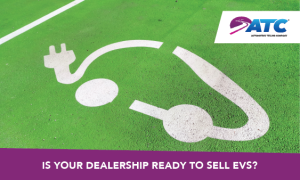
It has been said over and over that electric vehicles are the future. Has your dealership started selling them yet? As major manufacturers and start-ups introduce more and more EV models, you undoubtedly will. This blog post is meant to help you think about what you need to do and know to confidently sell electric vehicles, new or used, at your dealership.
First, a few statistics. In Q2 2022, EV registrations were up 66% over Q2 2021, accounting for 5.6% of all new car sales. GM has said 40% of its U.S. models will be electric by the end of 2025 and Ford says it will be all-electric by 2040. Jaguar has declared it will become an all-electric brand by 2025. Globally, sales of EVs hit 6.6 million in 2021, or 8.6% of all new car sales (IEA).
It’s clear that the time to start preparing for the electric future is now, and here are some suggestions to put you on the right road.
If you haven’t already, you should install several charging stations on your lot. Not only will you use them for your own inventory but providing the service free to customers will help keep them loyal. It also allows you to show first-time EVs buyers or browsers how to charge the vehicle and use it as a selling tool (“you’ll never stop at a pump or get gas on your hands or shoes again!”)
Start educating your staff and customers on EV driving range. Most EVs can go more than 200 miles on a full charge and some can reach 400 miles. EVs do well in stop-and-go driving but consume more battery power at steady highway speeds. Also, hot and cold temperatures reduce EV range because of AC and heater use.
It’s also time to move away from MPGs and start talking about kWhs (kilowatt hours) and cost per kWh. The average EV gets around 3 to 4 miles for every kWh and if it is driven 1,000 miles a month with a $0.20 per kWh electric rate at the owner’s home, the charging cost would be $55 to $65 each month. It’s time to train your team on kWh math!
EVs don’t require as much maintenance as internal combustion engine vehicles because they have fewer components so your service department will undergo a seismic shift in how and how often it provides services to customers.
It might take decades for internal combustion engine vehicles to completely disappear and EV service will still include brakes, wheels and tires, and battery work. It will also include a lot of software and technology updates, so your service team should start learning EV basics now and positioning itself as THE authority on EV technology updates to prevent independent car centers from taking that business away from your dealership.
When selling EVs, lean into the environmental benefits of owning them; it’s as significant as the cost savings they provide.
Finally, keep close tabs on legislation regarding EV registration fees and tax credits so you can explain them to your buyers. Tax credits for EVs and hybrids are available, and because EVs use no gas, its users do not fund infrastructure improvements through the gas tax, so states will have to recoup that lost revenue from EV owners in some way, most commonly through higher annual registration fees.
Sales of EVs are increasing and soon you will be selling more of them. We hope this blog post helped you consider things you need to do to sell more electric vehicles. Remember, EVs will still need to be properly titled and licensed and ATC will be here to help you do that.
ATC provides the industry’s most accurate tax, title, and registration fee information to make the car buying experience easier for your shoppers and more profitable for dealers, lenders, and auto technology companies. We work with every DMV, in every jurisdiction in the country, to make it easier for you to sell cars.
The truth is in the data: ATC is the fastest, most accurate TT&L data provider and when you GO ATC, you get the Greatest Of All Titling Companies!
***
To learn more, contact us.




